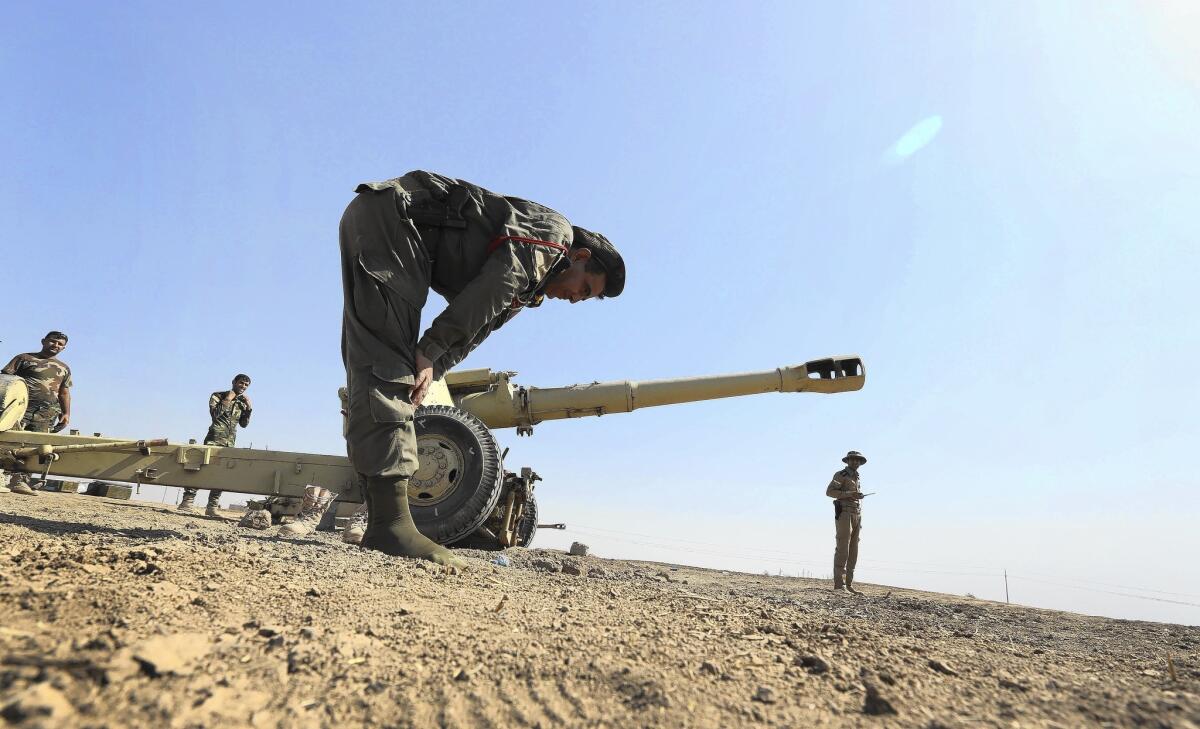Iraqi Kurdish forces moving toward complex battle in Mosul

Reporting from Khazir, Iraq — Three days after U.S. airstrikes in Iraq began, Islamic State militants fled west across the bridge spanning the Khazir River, destroying half of it with TNT.
The August explosion was meant to slow an offensive by Kurdish peshmerga forces to retake Iraqi towns seized by the Sunni Muslim extremist group. But the peshmerga created another path across the river and eventually regained control of a village in the shadow of the bridge.
In recent weeks, Kurdish fighters have made steady progress along this front line, pushing back Islamic State more than nine miles. But soon they are likely to find themselves on the far outskirts of Islamic State-controlled Mosul, Iraq’s second-largest city, where they will face what is more than just a military challenge. It will be one also fraught with political and sectarian considerations.
Islamic State militants were initially welcomed in June by many in the majority-Sunni Arab city, who were happy to see the Shiite Muslim-led Iraqi army flee. And though the brutal militants may have quickly worn out their welcome in the metropolis of 1.7 million, any effort to liberate Mosul by the army and peshmerga fighters from Iraq’s semiautonomous Kurdish region is bound to face huge hurdles.
“What allowed ISIS to come was the belief among Sunnis there was real oppression and that ISIS was the solution to get rid of the army,” said Nineveh province Gov. Atheel Nujaifi, using one of the acronyms for Islamic State.
“Mosul — it is a big challenge,” said Nujaifi, who was forced to flee to Irbil in nearby Kurdistan. “Not just the presence of ISIS, but the sensitivities in Mosul; the Sunni and Shiite sensitivities and the Iraqi army, which is seen as a Shiite army. As well as the Kurdish and Arab sensitivities.”
The support of Mosul’s Arab Sunnis, many of whom fled the onslaught of Islamic State, is central to liberating the city, the governor said during an interview at the English Village, a guarded housing community in the heart of Irbil that is home to foreign companies and others needing protection.
In the U.S.-assisted effort to degrade and destroy Islamic State in Iraq as well as Syria, Mosul must eventually loom as one of the key targets.
“Kurdistan will stay under threat if ISIS will stay in Mosul. In other words, the target for the time being must be Mosul,” Fuad Hussein, chief of staff to Kurdistan President Massoud Barzani, said this month at the U.S. Institute of Peace in Washington.
But newly installed Iraqi Prime Minister Haider Abadi’s plan to create a more inclusive government is moving slowly, and the forces that would be key to retaking Mosul, along with other cities in the country’s Sunni heartland, are still in the planning stages.
Hundreds of Mosul police officers are ready to be reorganized and retrained as a commando force able to take on Islamic State, Nujaifi said. They best know the layout of the city and have the trust of the people. Refugee camps in Kurdistan are full of such police who say they are waiting for new leadership that can retake their city.
Training is expected to begin soon, and Nujaifi predicted that a semi-paramilitary force would be ready within weeks. But how capable those fighters will be against the battle-hardened militants is unknown.
In the long term, the Iraqi government is considering creating provincial national guard units, which would provide an avenue for Sunnis to fight the militants in their own neighborhoods as well as absorb the Shiite militias that have been battling Islamic State.
U.S. Secretary of State John F. Kerry backed that idea during his visit to Iraq this summer. But so far, only volunteer sign-ups have occurred. Money and weapons must still come from the central government in Baghdad, and, thus far, the Iraqi parliament has failed to fund the mission.
“They haven’t moved until now,” said Rowsch Nuri Shaways, the Kurdish peshmerga commander on the Khazir front line, who added flatly, “maybe they’re busy with other things.”
But sufficient troops, weapons and training are just a portion of the equation.
“It is a complicated situation that needs to be studied,” Shaways said. “This requires a political operation to make sure that there is equalization in the constitution between all the ethnic groups in Iraq and to right the wrongs of the previous administration.”
Any military operation in Mosul cannot be successful without a political one, he said. Even if the forces were able to seize control of the city, it would be a short-lived victory if residents didn’t trust the central government.
“Liberating the Sunni areas is a responsibility for the Sunnis and they need an organized force,” he said, harking back to the Sunni insurgency that played a large role in fighting Al Qaeda militants during the U.S.-led Iraq war.
Unspoken is how Shiites, other sects and the Kurds, many of whom are Sunni, will work together with Sunni Arabs who recently turned on them.
The town of Hassan Sham, just north of the Khazir bridge, was liberated from Islamic State last month in a daylong battle. Some Arab residents sided with Islamic State, spying and taking up arms against the peshmerga, said Maj. Karon Ahmad.
“The Arabs betrayed us and worked with ISIS,” Ahmad said.
The town of only a few thousand residents, he said, is a small example of what the peshmerga could face just a few miles down the highway in Mosul.
More to Read
Sign up for Essential California
The most important California stories and recommendations in your inbox every morning.
You may occasionally receive promotional content from the Los Angeles Times.











